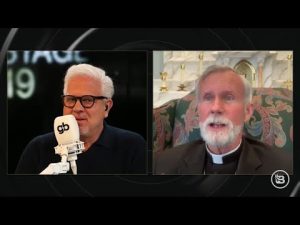In a drama-filled press conference that many are calling a symbol of societal chaos, Dominique Alexander took center stage, catching the attention of viewers across the nation. The event revolved around the heartbreaking murder of Austin Metcalf, a 17-year-old high school student tragically killed during a track meet. It seems that in the convoluted world of current events, this tragedy has become a stage for an entirely different sort of spectacle, leaving many scratching their heads in disbelief.
Austin Metcalf’s death has sent shockwaves through the community. Reports indicate that his life was claimed during a violent confrontation with classmate Carmelo Anthony, who allegedly brought a knife to the event for reasons that remain unclear. While the accused suggests that the stabbing was an act of self-defense, the details surrounding the incident have sparked a firestorm of emotions and opinions. The situation intensified further as a GoFundMe campaign surfaced, reportedly accumulating over $465,000, leaving many to wonder about the motivations behind such generosity.
As emotions ran high during the press conference, an unexpected visitor arrived: the father of the victim, who had openly expressed forgiveness for the young man who took his son’s life. Rather than receiving solidarity, the grieving father was removed from the event, as his presence was labeled disrespectful by some involved. Ironically, the very notion of forgiveness became a focal point in a discussion that many thought should center around justice, grief, and unity after such a horrific event.
Yet, amidst the turmoil, the behavior of the event’s host, struggling to maintain decorum while attacking the victim’s family, seemed to symbolize a larger problem within the movement attempting to address these issues. The host, representing the so-called “Next Generation Action Network,” attempted to downplay the complexities of the situation, calling for unity and understanding, but the underlying narrative remained steeped in division and aggression. These antics have led many to question whether the goal is true justice for Austin Metcalf or merely the amplification of outrage for personal or political gains.
The conference also took a bizarre turn as the organizer blamed the weather for the tragic events, suggesting that had the track meet been canceled due to rain, perhaps no one would have lost their life. This line of reasoning struck many as odd and deflected responsibility from the individuals involved. In a country where the weather report is often seen as the least of our concerns, it is perplexing to think that it should be cited as a factor in such grave circumstances.
As the press conference dragged on, it became evident that the rhetoric surrounding race and victim status was being wielded to score points rather than address the underlying issues that led to Austin’s untimely death. Among all the talk about racism and community tensions, the most important question—the genuine quest for justice and prevention of future tragedies—seemed to fall through the cracks. Instead of finding common ground, the event turned into yet another display of division, as various groups spun narratives for their own agendas.
As this story continues to unfold in the headlines, it raises a fundamental question: when will we put aside grievances in favor of unity? There are moments when society must come together to address the deep-rooted issues of violence and division. Perhaps this tragedy can serve as a catalyst for reflection and a renewed focus on healing rather than further conflict. However, if the reactions of community leaders and activists are any indication, the path to understanding and reconciliation may still be a long, winding road, fraught with more hurdles than solutions. In the end, Austin Metcalf’s passing should remind everyone of the urgency to shift the narrative from anger and blame to healing and hope for a better future.







